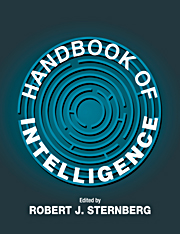Crossref Citations
This Book has been
cited by the following publications. This list is generated based on data provided by Crossref.
Sternberg, Robert J.
2000.
The Theory of Successful Intelligence.
Gifted Education International,
Vol. 15,
Issue. 1,
p.
4.
Sternberg, Robert J.
and
Grigorenko, Elena L.
2001.
Unified psychology..
American Psychologist,
Vol. 56,
Issue. 12,
p.
1069.
Sternberg, Robert J.
2001.
Giftedness as Developing Expertise: A theory of the interface between high abilities and achieved excellence.
High Ability Studies,
Vol. 12,
Issue. 2,
p.
159.
Seitz, Jay A.
2001.
A Cognitive-Perceptual Analysis of Projective Tests Used with Children.
Perceptual and Motor Skills,
Vol. 93,
Issue. 2,
p.
505.
Sternberg, Robert J.
2001.
What is the common thread of creativity? Its dialectical relation to intelligence and wisdom..
American Psychologist,
Vol. 56,
Issue. 4,
p.
360.
Roberts, Richard D.
Zeidner, Moshe
and
Matthews, Gerald
2001.
Does emotional intelligence meet traditional standards for an intelligence? Some new data and conclusions..
Emotion,
Vol. 1,
Issue. 3,
p.
196.
Barrett, Paul
2002.
Looking Down on Human Intelligence: From Psychometrics to the Brain.
Journal of Psychophysiology,
Vol. 16,
Issue. 3,
p.
187.
Knight, Peter T.
and
Yorke, Mantz
2002.
Employability through the curriculum.
Tertiary Education and Management,
Vol. 8,
Issue. 4,
p.
261.
2002.
Blackwell Handbook of Childhood Cognitive Development.
p.
620.
Sternberg, Robert J.
2003.
WICS: A Model of Leadership in Organizations.
Academy of Management Learning & Education,
Vol. 2,
Issue. 4,
p.
386.
Sternberg, Robert J.
2003.
A Broad View of Intelligence: The Theory of Successful Intelligence..
Consulting Psychology Journal: Practice and Research,
Vol. 55,
Issue. 3,
p.
139.
Sternberg, Robert J.
2003.
Handbook of Psychology.
p.
135.
Kaufmann, Geir
2003.
What to Measure? A new look at the concept of creativity.
Scandinavian Journal of Educational Research,
Vol. 47,
Issue. 3,
p.
235.
Arendasy, Martin E.
and
Gittler, Georg
2003.
IRT-basierter Vergleich zweier Varianten automatisiert erstellter Matrizentestaufgaben.
Zeitschrift für Differentielle und Diagnostische Psychologie,
Vol. 24,
Issue. 4,
p.
261.
Gorissen, Mariëlle
2004.
Intelligent gebruik van intelligentietests: IQ in de GGZ.
Psychopraxis,
Vol. 6,
Issue. 3,
p.
101.
Zeidner, Moshe
Matthews, Gerald
and
Roberts, Richard D.
2004.
Emotional Intelligence in the Workplace: A Critical Review.
Applied Psychology,
Vol. 53,
Issue. 3,
p.
371.
Dow, Gayle T.
and
Mayer, Richard E.
2004.
Teaching Students to Solve Insight Problems: Evidence for Domain Specificity in Creativity Training.
Creativity Research Journal,
Vol. 16,
Issue. 4,
p.
389.
Sternberg, Robert J.
2004.
Culture and Intelligence..
American Psychologist,
Vol. 59,
Issue. 5,
p.
325.
Kaufmann, Geir
2004.
Two Kinds of Creativity – But Which Ones?.
Creativity and Innovation Management,
Vol. 13,
Issue. 3,
p.
154.
Dow, Gayle T.
and
Mayer, Richard E.
2004.
Teaching students to solve insight problems: Evidence for domain specificity in creativity training.
Creativity Research Journal,
Vol. 16,
Issue. 4,
p.
389.



